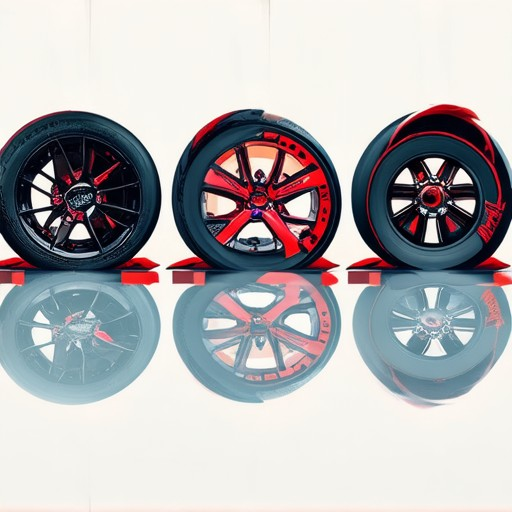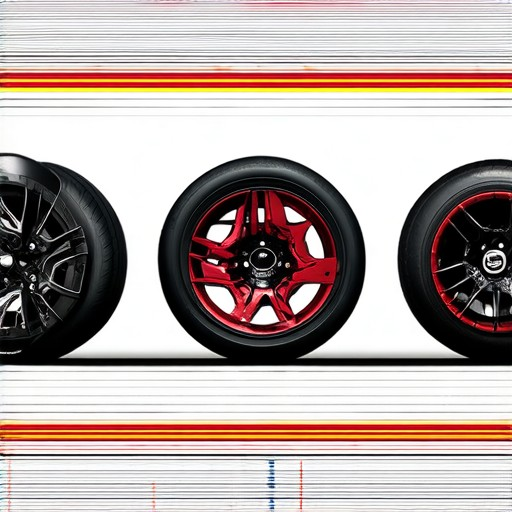When it comes to enhancing your vehicle’s performance, one of the most significant upgrades you can make is switching to lightweight and durable wheels. Among the many options available, carbon fiber rims have gained popularity for their unique combination of strength, weight savings, and aesthetic appeal. While traditionally, alloy and steel wheels have been the go-to choices, carbon fiber rims offer a compelling alternative with their superior properties. In this article, we will delve into the costs, benefits, and drawbacks of carbon fiber rims, comparing them to alloy and steel wheels to help you make an informed decision. Whether you’re a car enthusiast, a cyclist, or someone looking to optimize your ride’s performance, understanding the differences between these wheel materials is crucial. We’ll explore everything from the price ranges and maintenance needs to the long-term durability and impact on handling. By examining the pros and cons of each option, this analysis aims to guide you toward selecting the best wheel solution for your lifestyle and driving habits.
Key Takeaways
– Strength and Weight: Carbon fiber rims offer a significantly higher strength-to-weight ratio compared to alloy and steel rims, making them ideal for applications requiring both durability and lightweight performance.
– Cost Considerations: While carbon fiber rims are notably more expensive, ranging from $60 to $120 per kilogram, steel rims are more cost-effective, priced between $0.50 and $1.50 per kilogram.
– Material Performance: Among the strongest materials, carbon fiber, steel, and titanium rims stand out, with carbon fiber excelling in strength and weight, while steel provides exceptional rigidity and durability.
– Balanced Choice: For riders prioritizing cost-effectiveness and versatility, alloy rims offer a good middle ground, combining strength and weight without the premium cost of carbon fiber.

Carbon Fiber Rim Cost Overview
The cost of carbon fiber rims varies depending on several factors including size diameter finish and customization options. Here’s a breakdown of pricing for the Incubus Wheels CF207 model:
Incubus Wheels CF207
- Diameter: 21″
- Weight: 15.9 lbs per wheel
- Price Range: $1,200 – $1,500 per wheel (depending on finish and customization)
Factors influencing the cost include:
- Size and width of the rim
- Finish type (standard or premium)
- Customization features (e.g., center caps or logo)
- Brand and manufacturer reputation
- Market demand and availability
Competitors often offer similar pricing ranges with slight variations. Some alternative brands include:
- Alpine Wheels – Known for lightweight construction
- Helix Wheels – Offers customizable options
- Volkswagen Parts – Affordable options
- Audi Centers – Premium finishes
When comparing brands always consider warranty and customer service alongside pricing. For those seeking high-end performance and style the Incubus Wheels CF207 remains a top choice.
Disadvantages of Carbon Fiber Wheels
- High Cost: Carbon fiber wheels are generally more expensive than traditional alloy wheels due to their complex manufacturing process and premium materials.
- Weight: While carbon fiber offers strength, it also adds significant weight, which can affect handling and fuel efficiency, particularly in vehicles with smaller engines.
- Maintenance Requirements: Proper care is essential to prevent corrosion and damage, requiring regular cleaning and application of protective treatments.
- Performance in Certain Conditions: Despite their strength, carbon fiber wheels may not always outperform traditional wheels in extreme weather conditions or rough terrain.
- Durability Concerns: While strong and lightweight, carbon fiber can be brittle under impact, making them more susceptible to cracking in harsh driving situations.
- Repair Complexity: Repairs to carbon fiber wheels can be challenging and often require specialized knowledge and tools, making them less accessible for casual users.

Is Carbon Fiber Stronger Than Alloy?
Carbon fiber is generally stronger than many aluminum alloys, particularly when compared at similar weights and dimensions. Its strength-to-weight ratio is significantly higher, making it a preferred material in applications requiring high strength with minimal mass.
- Strength-to-Weight Ratio: Carbon fiber can be up to 5 times stronger than aluminum alloys of the same weight. For instance, a carbon fiber sheet might weigh 10 kg and achieve a higher tensile strength compared to an aluminum sheet of the same weight.
- Tensile Strength: Carbon fiber materials typically exhibit tensile strengths ranging from 500 to 700 MPa, while aluminum alloys often range between 100 to 300 MPa. This difference contributes to carbon fiber’s superior strength characteristics.
- Real-World Applications: Carbon fiber is widely used in high-performance industries like aerospace and automotive, where weight reduction is critical. It’s common in bicycle frames, aircraft components, and Formula 1 car parts due to its exceptional strength properties.
When considering competitors, brands like Aerofoil and Enveo also utilize carbon fiber for its strength and lightweight benefits. These manufacturers offer comparable or even superior performance in certain applications, showcasing the versatility of carbon fiber technology.
Cost and Manufacturing: While carbon fiber is often more expensive to manufacture and use than aluminum, its superior strength makes it a valuable material in specific scenarios. The choice between the two depends on the intended application, budget, and performance requirements.
In conclusion, carbon fiber is indeed stronger than many aluminum alloys, offering greater tensile strength and a better strength-to-weight ratio. However, both materials have their place in various applications, and the optimal choice often hinges on specific needs and constraints.

Are Carbon Fiber Wheels Stronger Than Steel?
Carbon fiber wheels are generally considered stronger than steel wheels due to their higher strength-to-weight ratio and superior tensile properties. Carbon fiber composite materials are known to be nearly twice as strong as steel while being significantly lighter. This makes them ideal for applications where both strength and weight reduction are critical, such as in mountain biking or road cycling.
- Strength-to-Weight Ratio: Carbon fiber offers a much higher strength-to-weight ratio compared to steel. This means wheels made from carbon fiber can support the same load as steel wheels but with less material, leading to improved performance and efficiency.
- Density: Carbon fiber is approximately five times less dense than steel. Lower density translates to reduced rotational mass, which can enhance handling and acceleration, particularly on mountain bikes where weight distribution is crucial.
- Tensile Strength: Carbon fiber exhibits exceptional tensile strength, often exceeding that of steel. This makes it highly resistant to fatigue, which is important for long-term durability under stress.
However, while carbon fiber wheels may be stronger in many cases, they are not necessarily the best choice for every application. Steel wheels can sometimes offer better impact resistance and are often preferred for certain types of terrain or heavy-duty use. The choice between carbon fiber and steel wheels ultimately depends on the specific requirements of the bike and the rider.
For more information on wheel materials and their performance, visit our Incubus Wheels website. We provide detailed insights into the differences between carbon fiber and steel wheels, along with recommendations for various cycling disciplines.
Competitors like Aluminum Wheels and others also offer strong alternatives, so it’s worth considering your specific needs and preferences when choosing wheels.
How Expensive is Carbon Fiber Compared to Steel?
Carbon fiber and steel differ significantly in cost due to their unique manufacturing processes and properties.
Cost Comparison
- Carbon fiber typically costs $60 to $120 per kilogram , making it one of the most expensive materials available.
- Steel, on the other hand, is relatively inexpensive, costing approximately $0.50 to $1.50 per kilogram .
Factors Influencing Cost
The cost difference stems from:
- Manufacturing Complexity: Carbon fiber production involves intricate processes like high-temperature treatment and resin impregnation, which are labor-intensive and resource-heavy.
- Material Properties: Carbon fiber offers exceptional strength-to-weight ratios and thermal stability, qualities that justify its higher price.
- Application-Specific Needs: While carbon fiber is ideal for lightweight, high-performance applications, steel remains a cost-effective choice for basic structural needs.
Weight and Performance Considerations
While carbon fiber may seem more expensive, its lightweight nature often offsets costs in applications requiring portability or reduced mass. Steel, though heavier, is frequently chosen for its durability and lower cost in construction and automotive industries.
For more insights into material selection and cost management, visit our website .

What is the Strongest Material Wheels Are Made Of?
- Aluminum: Aluminum is widely used due to its lightweight properties, making it ideal for vehicles seeking improved performance and fuel efficiency. While it offers decent strength, it is often combined with steel in alloy wheels for added durability.
- Steel: Known for its exceptional strength and rigidity, steel wheels are commonly used in trucks, SUVs, and off-road vehicles. They provide reliable performance despite their heavier weight.
- Carbon Fiber: Carbon fiber wheels are among the strongest and lightest options available, often found in high-performance bicycles and racing cars. Their premium cost reflects their advanced engineering.
- Titanium: Titanium wheels offer unmatched strength-to-weight ratios, making them a top choice for applications requiring minimal weight, such as certain racing vehicles or luxury cars.
- Magnesium: Magnesium wheels are lightweight yet strong, providing excellent durability. They are less common but find use in specialized applications where both strength and weight savings are important.
When choosing the strongest material for wheels, consider factors like weight, strength, and intended use. Steel and aluminum remain popular choices for everyday vehicles, while carbon fiber and titanium cater to specific performance needs.




0 Comments